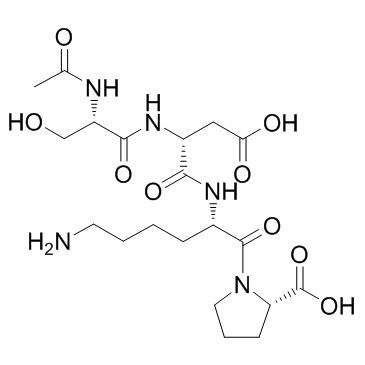N-Acetyl-Ser-Asp-Lys-Pro |
| Catalog No.GC33889 |
N-Acetyl-Ser-Asp-Lys-Pro, an endogenous tetrapeptide secreted by bone marrow, is a specific substrate for the N-terminal site of ACE.
Products are for research use only. Not for human use. We do not sell to patients.

Cas No.: 127103-11-1
Sample solution is provided at 25 µL, 10mM.
N-Acetyl-Ser-Asp-Lys-Pro is a natural and specific substrate for the N-terminal site of ACE.
N-Acetyl-Ser-Asp-Lys-Pro is an endogenous tetrapeptide secreted by bone marrow and is ubiquitously found in plasma and various tissues. N-Acetyl-Ser-Asp-Lys-Pro is degraded specifically by ACE, and its plasma level rises substantially during ACE inhibitor therapy. N-Acetyl-Ser-Asp-Lys-Pro inhibits the proliferation of isolated cardiac fibroblasts but significantly stimulates the proliferation of vascular smooth muscle cells. Flow cytometry of rat cardiac fibroblasts treated with N-Acetyl-Ser-Asp-Lys-Pro shows significant inhibition of the progression of cells from G0/G1 phase to S phase of the cell cycle. In cardiac fibroblasts transfected with a Smad-sensitive luciferase reporter construct, N-Acetyl-Ser-Asp-Lys-Pro decreases luciferase activity by 55%. Moreover, phosphorylation and nuclear translocation of Smad2 is decreased in cardiac fibroblasts treated with N-Acetyl-Ser-Asp-Lys-Pro[1]. N-acetyl-seryl-aspartyl-lysyl-proline is a negative regulator of hematopoietic stem cell proliferation. N-acetyl-seryl-aspartyl-lysyl-proline is involved in the control of hematopoietic stem cell proliferation by preventing their recruitment into S-phase. N-acetyl-seryl-aspartyl-lysyl-proline appears to exert this function by blocking the action of a stem cell-specific proliferation stimulator and acts selectively on quiescent progenitors[2]. N-Acetyl-Ser-Asp-Lys-Pro inhibits collagenase expression and activation is associated with increased expression of TIMP-1 and TIMP-2. N-Acetyl-Ser-Asp-Lys-Pro does not alter collagenase or gelatinase activity in cardiac fibroblasts under basal conditions, but blunts the IL-1β-induced increase in total collagenase activity. Similarly, N-Acetyl-Ser-Asp-Lys-Pro normalizes the IL-1β-mediated increase in MMP-2 and MMP-9 activities and MMP-13 expression[3].
N-Acetyl-Ser-Asp-Lys-Pro prevents hypertension-induced inflammatory cell infiltration, collagen deposition, nephrin downregulation and albuminuria, which could lead to renoprotection in hypertensive mice[4].
[1]. Rousseau A, et al. The hemoregulatory peptide N-acetyl-Ser-Asp-Lys-Pro is a natural and specificsubstrate of the N-terminal active site of human angiotensin-converting enzyme. J Biol Chem. 1995 Feb 24;270(8):3656-61. [2]. Pokharel S, et al. N-acetyl-Ser-Asp-Lys-Pro inhibits phosphorylation of Smad2 in cardiac fibroblasts. Hypertension. 2002 Aug;40(2):155-61. [3]. Rhaleb NE, et al. N-acetyl-Ser-Asp-Lys-Pro inhibits interleukin-1β-mediated matrix metalloproteinase activation in cardiac fibroblasts. Pflugers Arch. 2013 Oct;465(10):1487-95. [4]. Rhaleb NE, et al. Renal protective effects of N-acetyl-Ser-Asp-Lys-Pro in deoxycorticosterone acetate-salt hypertensive mice. J Hypertens. 2011 Feb;29(2):330-8.
Average Rating: 5 (Based on Reviews and 15 reference(s) in Google Scholar.)
GLPBIO products are for RESEARCH USE ONLY. Please make sure your review or question is research based.
Required fields are marked with *




















